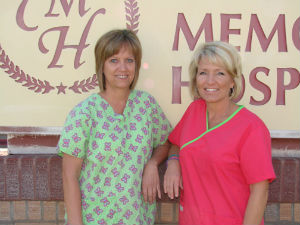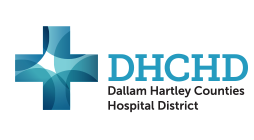
Respiratory
The Respiratory Care department is a multidisciplinary team made up of 5 full time, qualified licensed therapists. The director of Respiratory Care is Misty Potter, BSRC, RRT and she has been with DHCHD since 2003. The Assistant Director is Jamie Batenhorst, RRT and she has been with DHCHD since 2008.
The team provides physician ordered and protocol directed therapeutic care to patients with pulmonary complications of all ages. Our Respiratory therapists are responsible for performing a number of vital functions such as being a part of the "Trauma Team", attending and assisting with all births, performing and analyzing Arterial Blood gas testing, Pulmonary Function testing, EEG's, EKG's and various other testing. Some of the responsibilities are seasonal such as upper respiratory infections, pneumonia and RSV which are prevalent in winter and asthma or other bronchial problems which come up with spring allergies. We also do some of the pre-employment testing for local businesses.
Our newest outpatient testing service is our Sleep Study Lab. Sleep studies are tests that record what happens to your body during sleep. The studies are done to find out what is causing your sleep problems. Sleep problems include:
- Sleep apnea, which is defined as when an adult regularly stops breathing during sleepfor 10 seconds or longer.
- Problems staying awake such as narcolepsy.
- Problems with nighttime behaviors, such as sleepwalking, night terrors, or bed-wetting.
- Problems with sleeping at night (insomnia). This may be caused by stress, depression, hunger, physical discomfort or other problem.
- Problems sleeping during the day because you work at night or do rotating shift work.
- This sleep problem is called shift work sleep disorder.
- Conditions such as periodic limb movement disorder, which is repeated muscle twitching of the feet, arms or legs during sleep.
Sleep studies can also determine whether you have a problem with your stages of sleep. The two stages of sleep are non-rapid eye movement (NREM) and rapid eye movement (REM). Normally, NREM and REM alternate four to five times during a night's sleep. A change in this cycle may make it hard for you to sleep soundly.
